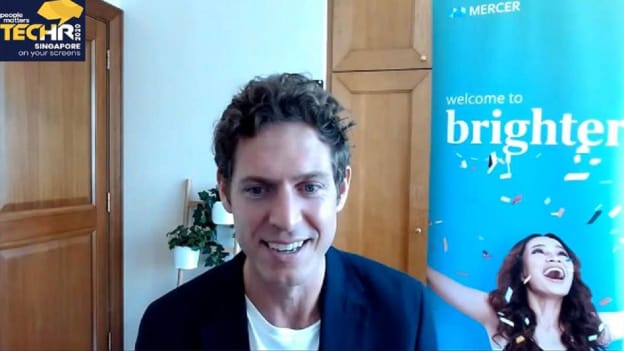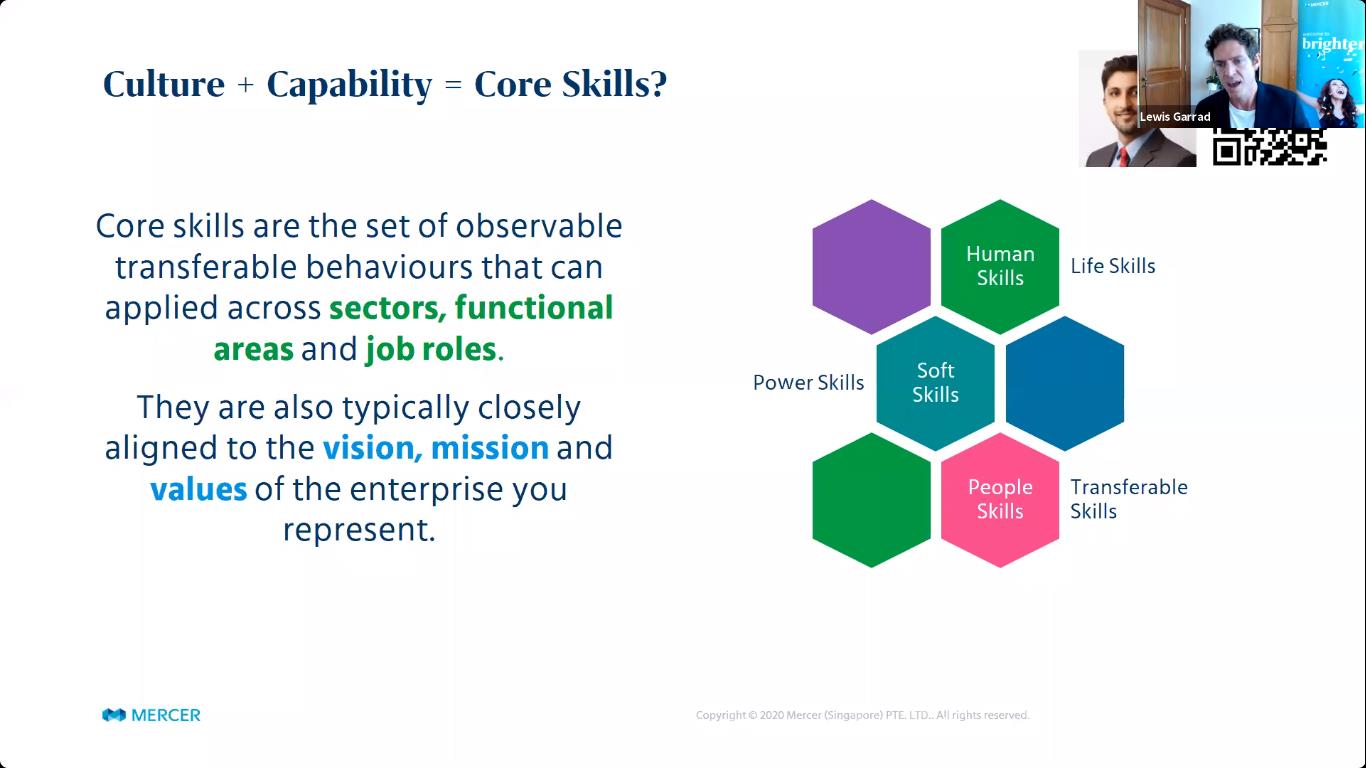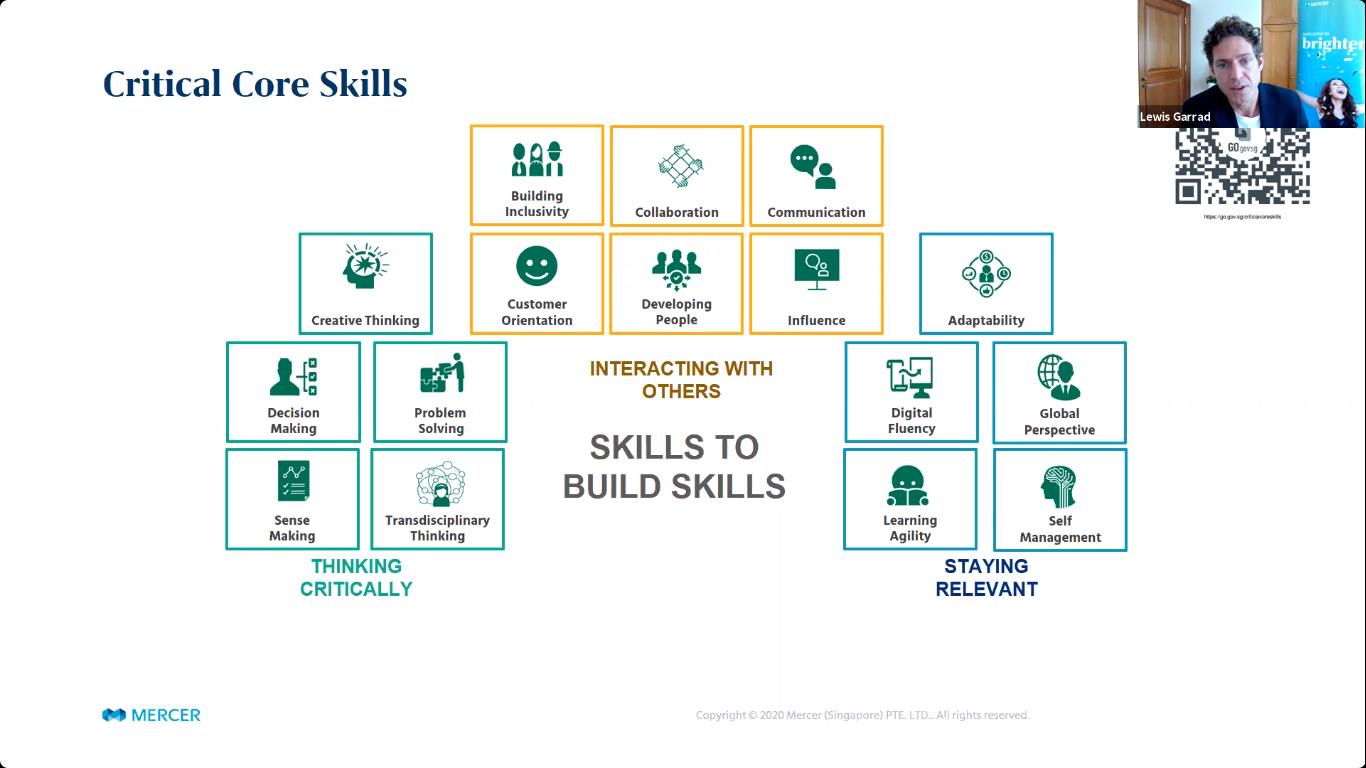Building a workforce that has the skills to build skills

In a disrupted business environment, existing skill sets of the workforce and the potential learning curve are crucial to determining business sustainability as well as scalability. But how equipped is the existing talent today, and how prepared are organizations to build a workforce together that has the skills, to be able to build skills relevant and critical for survival in the face of evolution?
In his masterclass on “Winning the talent race in the digital economy: Skills to Build Skills” at People Matters TechHR 2020, Lewis Garrad, Partner and Employee Experience Practice Leader, International Region, Mercer, discussed the need to look at soft skills as ‘core skills’, redesigning jobs for skills transformation and threw light on why change being the ‘new normal’ is a fallacy.
Read on for highlights from the session.
We are in a period of extraordinary change
Highlighting the amount of change the world has experienced in the last 300 years, Garrad kickstarted the masterclass suggesting that change as a ‘new normal’ is a fallacy. “Change has been normal since the 1800s...The reason things so often feel intense, COVID-19 aside, is because we are in a period of extraordinary change,” he reckoned.
The scale of change is evident not just at work, but in the entire ecosystem. “We have moved from a period where we used to learn about products in order to use them, to using products and services that now learn about us.” Stating the above, he added that this ecosystem has changed our relationship with the economy and the things we use.
“We are now competing with machines in terms of our ability to learn and increasingly that will be an important part of human competitive advantage.”
Here are three aspects that humans must think about to stay competitive:
- Think about how products are learning about us
- Think about how much value that is generating in our economy
- Think about what the above means for us as we go to work
Speaking about the predicted evolution of roles, he highlighted that this evolution isn’t just indicative and relevant for the workforce and organization you are working with, it’s also relevant personally for you, “What does this mean for you and your job, what is the future of work for you?”
In current times where we witness change at an exponential pace, learning is the bedrock of being relevant and moving forward. Learning drives change - “Learning generates new thinking, new thinking creates new behaviours, new behaviours create new outcomes, and those outcomes again generate new thinking. It’s a virtuous cycle that drives consistent change in the world around us.” We have to reflect on how that impacts our work and how we in turn can contribute to the economy, added Garrad.
How is your role impacted by the evolution of jobs
The existing and expected economic environment demands agility, continuous learning and being prepared for any new challenges that come our way. While one often addresses skilling from a workforce perspective, it is becoming increasingly important to also reflect and assess skilling from an individual perspective. What does the rapidly evolving world of work mean for your role? How is your role impacted? What do you need to do to stay skilled and relevant?
Recalling the Flynn Effect as established by Professor James Flynn - 'our cognitive skills evolve to meet the demands placed on them'. Critical to survival, there is a need to adapt a “growth-mindset”. Mindsets are belief systems, noted Garrad, that are great for building culture, values and shared behaviour as well as building individual competence.
“Growth mindset can help you build a shared set of beliefs around the importance of learning all the time.”
On an organizational level, Garrad said, “We need to be able to ask ourselves what does it take to be an organization that actually has this learning and growth mindset. How can we bring that to life?”
Soft skills or core skills?
Organizations today are increasingly focused on technology talent, willing to offer significant reward premium in these roles, “because at the cutting edge of expertise, is the application and development of new technologies.” However, despite the growing demand for technology-abled jobs, given the rising focus on digitization, there exist core skills that make one efficient at what they do, over and above the expected technological proficiency.
“It’s not just about what jobs are emerging, but what skills and capabilities does it take for people to actually be good at those jobs and deliver long-term value for your organization."
"This is where you start to see the understanding or the emergence of the core behaviour skills,”noted Garrad.
He shared report findings that revealed key in-demand behavioural skills including but not limited to: Willingness to be flexible, agile and adaptable to change; time management skills and ability to prioritize; ability to work effectively in team environments; and the ability to communicate effectively in business context.
 He shared that it is essential to not look at culture in isolation, but rather look at the connection between culture and capability.
He shared that it is essential to not look at culture in isolation, but rather look at the connection between culture and capability.
Soft skills are no longer just good to have softer skills, rather they are the hard core skills, or ‘power skills’, that make one efficient and effective in the current role, while also being effective in any new role taken up, owing to the transferability aspect of people skills, and life-long relevance of human skills.
There is an urgency to reassess the relevance and importance given to core skill development. Some ways to that include:
- Culturally align core skill development
- Create a culture of mentorship
- Offer continuous feedback
- Apply collaborative micro-learning in the flow of work
- Make core skills tangible
- Measure impact
Redesigning jobs for skills transformation
Garrad emphasized that skills transformation begins with redesigning jobs, and jobs of the future must factor in aspects such as: Increased demand and competition for technical skills; increased importance of broader cognitive skills; increased relevance of agile, collaborative ways of working; and shorter shelf-life of skills, given the pace of change.
Speaking of communicating such redesigning of jobs to the larger talent pool, he shared that core skills appear much more frequently in job postings in the US and UK, appearing more than twice as often in the US as compared to Singapore.
In fact, the “top 8” core skills in the US appear in more than 20% of all job descriptions, whereas in Singapore and HongKong only “top 3” core skills appear in more than 20% of all job descriptions, indicating a likely narrower outlook towards soft skills in the Asian region, owing to greater focus on technical skills.
He insisted on ensuring that talent professionals must articulate the demand for critical core skills:
- Review job ads -internal and external: Are core skills clearly identified as needs?
- Review evaluation criteria: Are core skills clearly measured?
- Review your career frameworks: How do people progress? What role do core skills play?
Critical core skills to build skills
When it comes to organizations evaluating what core skills are critical for their functions, Garrad recommended a skills-based talent management approach that involves three steps: Assess (How do i measure my skills gap), Identify (What are the skills of the future) and Develop (How do I upskill).
While the criticality of individual skills might vary from organization to organzation, keeping the future of work in mind, Mercer has broken down core skills under three larger umbrellas. Garrad discussed the relevance of each of these as a core skill critical in both the current work environment as well as their criticality in the future of work:

- Cognitive capabilities: Under cognitive capabilities or the segment on ‘Thinking critically’, skills like creative thinking, decision-making, problem solving, sense making and transdisciplinary thinking have been bucketed.
These skills go a long way in enabling an individual to navigate their way through any disruption in the business environment by thinking analytically and arriving at business solutions with a logical and growth-oriented mindset.
- Social skills: Garrad highlighted that many people take social skills for granted, and there are also instances where the importance of social skills is undermined. Emphasizing the need to build stronger social skills he said, “The volume of people that we communicate with at any point of time causes us to have to think really differently about what is it that’s needed to be effective around others...Being able to be effective is a critical part of being successful.”
- Staying Relevant: The segment on staying relevant covers skills such as adaptability, learning agility, self-management, digital fluency and having a global perspective. These are extremely relevant not just in today's context, but in any uncertain situation the workforce comes across.
Change is inevitable. As Garrad rightly said, “People should expect change more often throughout their career.” Building core skills that remain unshaken in the face of change, disruption and evolution, therefore, is critical to survival of both individuals and organizations.
















